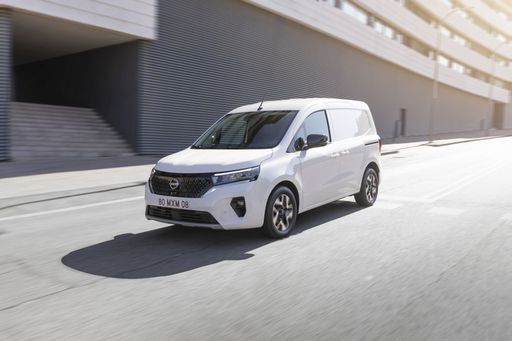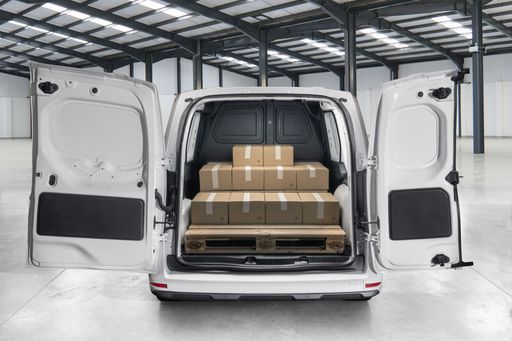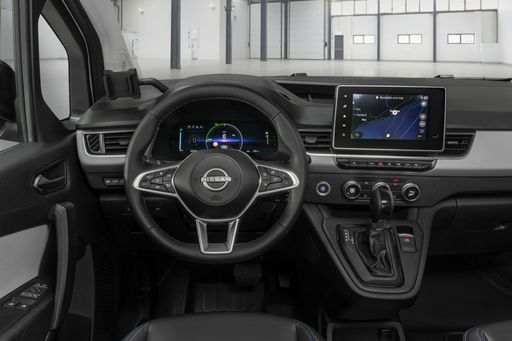In the competitive world of compact commercial vehicles, the Nissan Townstar Furgoneta Compacta and the Renault Express emerge as strong contenders. Both models cater to businesses looking for functionality, efficiency, and innovation in urban environments. Let’s dive into a detailed comparison that highlights their technical specifications, features, and overall value.
Nissan Townstar Compact Van vs Renault Express - Differences and prices compared
Compare performance (130 HP vs 102 HP), boot space and price (24200 £ vs 17100 £ ) at a glance. Find out which car is the better choice for you – Nissan Townstar Compact Van or Renault Express?
Engine and Performance
The Nissan Townstar Furgoneta Compacta offers a variety of engine options, including petrol and electric variants. The petrol version generates a respectable 130 HP with a torque of 240 Nm, while its electric counterpart delivers 122 HP and boasts an impressive range of up to 301 km on a single charge, thanks to a robust 45 kWh battery.
In contrast, the Renault Express comes equipped with either diesel or petrol engines, with power outputs ranging from 75 HP to 102 HP. Its peak torque of 240 Nm supports solid performance. However, the Express falls behind in electric options, which could limit its appeal in increasingly eco-conscious markets.
Transmission and Driving Experience
Both the Townstar and Express feature front-wheel drive systems, which enhance traction and maneuverability—ideal for city driving. The Nissan Townstar comes with a choice of manual and automatic transmissions, allowing drivers to select their preferred driving style. Its top speed hits an impressive 183 km/h.
The Renault Express, however, is limited to a manual gearbox, providing a straightforward albeit less versatile driving experience compared to its competitor. Its top speed reaches 167 km/h, which, while adequate, slightly trails behind the Townstar.
Fuel Efficiency and Emissions
Fuel consumption is a significant consideration for commercial vehicles. The Nissan Townstar records fuel consumption figures ranging from 6.7 to 7.1 L/100 km, depending on the configuration. The electric variant, with its 17.4 kWh/100 km consumption, offers an eco-friendly alternative for urban deliveries.
The Renault Express impresses with its fuel efficiency, achieving as low as 4.6 L/100 km, making it a cost-effective choice for businesses focused on minimizing operational costs. However, this advantage is somewhat offset by its higher emissions, with CO2 outputs ranging between 121 g/km and 149 g/km.
Interior and Payload Capacity
Inside, both vehicles are designed with functionality in mind, providing two seats and ample cargo space. The Nissan Townstar features a payload capacity of up to 775 kg, accommodating various business requirements. The spacious cargo area can handle sizeable loads while ensuring that the driver has a comfortable workplace.
The Renault Express has a slightly lower payload capacity, ranging from 575 kg to 700 kg, which may limit its appeal for heavier-duty tasks. Nevertheless, it still offers sufficient cargo space for many commercial applications.
Dimensions and Maneuverability
When it comes to size, the Nissan Townstar measures 4910 mm in length and 1860 mm in width, providing a substantial presence on the road. Its height of 1854 mm contributes to a spacious interior, while maintaining a manageable size for city maneuvering.
On the other hand, the Renault Express is more compact at 4393 mm long and 1775 mm wide, making it easier to navigate through tight urban spaces. However, this reduction in overall size may slightly limit cargo capacity compared to the Townstar.
Conclusion: Which One to Choose?
Choosing between the Nissan Townstar Furgoneta Compacta and the Renault Express ultimately depends on your specific needs. If you prioritize electric options, superior performance, and high load capacity, the Nissan Townstar is the clear winner. Conversely, if fuel efficiency and lower operational costs are your main concerns, the Renault Express stands out with its economical diesel and petrol engines. Whichever model you choose, both vehicles offer solid features tailored for today’s commercial demands.
Here’s where it gets real: The technical differences in detail
Costs and Efficiency:
Price and efficiency are often the first things buyers look at. Here it becomes clear which model has the long-term edge – whether at the pump, the plug, or in purchase price.
Renault Express has a clearly advantage in terms of price – it starts at 17100 £ , while the Nissan Townstar Compact Van costs 24200 £ . That’s a price difference of around 7090 £.
Fuel consumption also shows a difference: Renault Express manages with 4.60 L and is therefore convincingly more efficient than the Nissan Townstar Compact Van with 6.60 L. The difference is about 2 L per 100 km.
Engine and Performance:
Under the bonnet, it becomes clear which model is tuned for sportiness and which one takes the lead when you hit the accelerator.
When it comes to engine power, the Nissan Townstar Compact Van has a distinct edge – offering 130 HP compared to 102 HP. That’s roughly 28 HP more horsepower.
In terms of top speed, the Nissan Townstar Compact Van performs barely noticeable better – reaching 183 km/h, while the Renault Express tops out at 167 km/h. The difference is around 16 km/h.
There’s also a difference in torque: Nissan Townstar Compact Van pulls hardly perceptible stronger with 245 Nm compared to 240 Nm. That’s about 5 Nm difference.
Space and Everyday Use:
Whether family car or daily driver – which one offers more room, flexibility and comfort?
Seats: Nissan Townstar Compact Van offers significantly more seating capacity – 5 vs 2.
In curb weight, Renault Express is hardly perceptible lighter – 1296 kg compared to 1399 kg. The difference is around 103 kg.
In maximum load capacity, the Nissan Townstar Compact Van performs clearly perceptible better – up to 4900 L, which is about 1600 L more than the Renault Express.
When it comes to payload, Nissan Townstar Compact Van minimal takes the win – 775 kg compared to 700 kg. That’s a difference of about 75 kg.
Who wins the race in the data check?
The Nissan Townstar Compact Van holds a decisive overall lead in the objective data comparison.
This result only shows which model scores more points on paper – not which of the two cars feels right for you.
Costs and Consumption
View detailed analysis
Engine and Performance
View detailed analysis
Dimensions and Body
View detailed analysis

Nissan Townstar Compact Van
Nissan Townstar Compact Van
The Nissan Townstar is a smart, no-nonsense compact van that makes city running and tight deliveries feel almost effortless thanks to tidy packaging and clever storage. It keeps things sensible on the wallet and the road, offering a comfortable driving position and useful tech without flashy frills — the kind of workhorse you'll actually enjoy parking at the kerb.
details


Renault Express
The Renault Express is a no-nonsense city van that pairs clever packaging and practical cargo space with an easy-to-drive, fuss-free character. Built for small businesses and active families, it delivers rugged reliability and low running costs without pretension — a sensible workhorse with a wink.
detailsCosts and Consumption |
|
|---|---|
|
Price
24200 - 39900 £
|
Price
17100 - 19500 £
|
|
Consumption L/100km
6.6 - 7 L
|
Consumption L/100km
4.6 - 6.6 L
|
|
Consumption kWh/100km
18.5 - 20.9 kWh
|
Consumption kWh/100km
-
|
|
Electric Range
263 - 289 km
|
Electric Range
-
|
|
Battery Capacity
45 kWh
|
Battery Capacity
-
|
|
co2
0 - 159 g/km
|
co2
121 - 149 g/km
|
|
Fuel tank capacity
54 L
|
Fuel tank capacity
50 L
|
Dimensions and Body |
|
|---|---|
|
Body Type
Cargo Van
|
Body Type
Cargo Van
|
|
Seats
2 - 5
|
Seats
2
|
|
Doors
4 - 5
|
Doors
4
|
|
Curb weight
1399 - 1908 kg
|
Curb weight
1296 - 1390 kg
|
|
Trunk capacity
-
|
Trunk capacity
-
|
|
Length
4488 - 4910 mm
|
Length
4393 mm
|
|
Width
1860 mm
|
Width
1775 mm
|
|
Height
1822 - 1854 mm
|
Height
1811 mm
|
|
Max trunk capacity
3100 - 4900 L
|
Max trunk capacity
3300 L
|
|
Payload
537 - 775 kg
|
Payload
575 - 700 kg
|
Engine and Performance |
|
|---|---|
|
Engine Type
Petrol, Electric
|
Engine Type
Diesel, Petrol
|
|
Transmission
Manuel, Automatic
|
Transmission
Manuel
|
|
Transmission Detail
Manual Gearbox, Reduction Gearbox
|
Transmission Detail
Manual Gearbox
|
|
Drive Type
Front-Wheel Drive
|
Drive Type
Front-Wheel Drive
|
|
Power HP
122 - 130 HP
|
Power HP
75 - 102 HP
|
|
Acceleration 0-100km/h
-
|
Acceleration 0-100km/h
11.9 - 16.3 s
|
|
Max Speed
132 - 183 km/h
|
Max Speed
100 - 167 km/h
|
|
Torque
240 - 245 Nm
|
Torque
200 - 240 Nm
|
|
Number of Cylinders
4
|
Number of Cylinders
4
|
|
Power kW
90 - 96 kW
|
Power kW
55 - 75 kW
|
|
Engine capacity
1332 cm3
|
Engine capacity
1332 - 1461 cm3
|
General |
|
|---|---|
|
Model Year
2022 - 2025
|
Model Year
2021
|
|
CO2 Efficiency Class
F, E, A
|
CO2 Efficiency Class
D, E
|
|
Brand
Nissan
|
Brand
Renault
|
Is the Nissan Townstar Compact Van offered with different drivetrains?
The Nissan Townstar Compact Van is available as Front-Wheel Drive.
